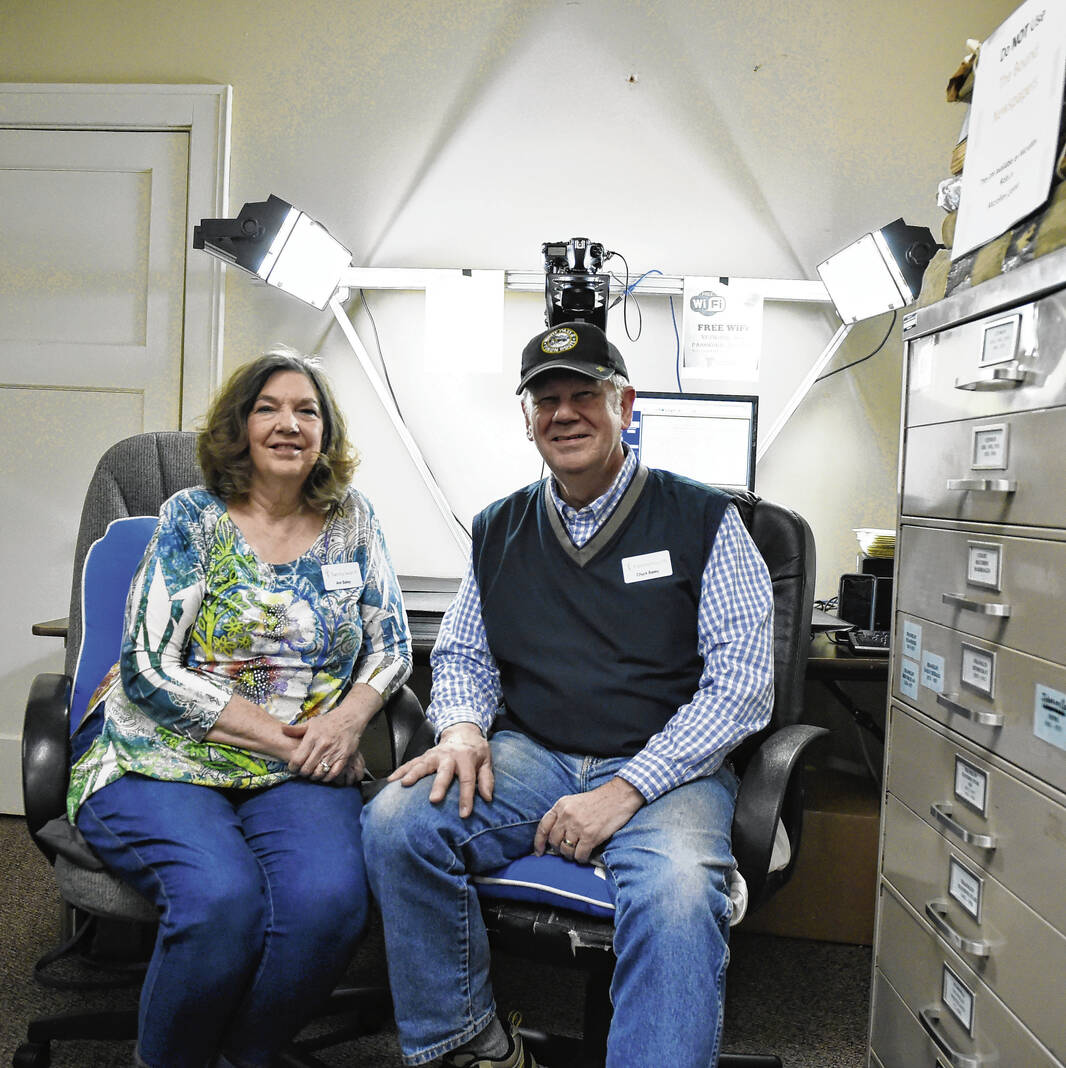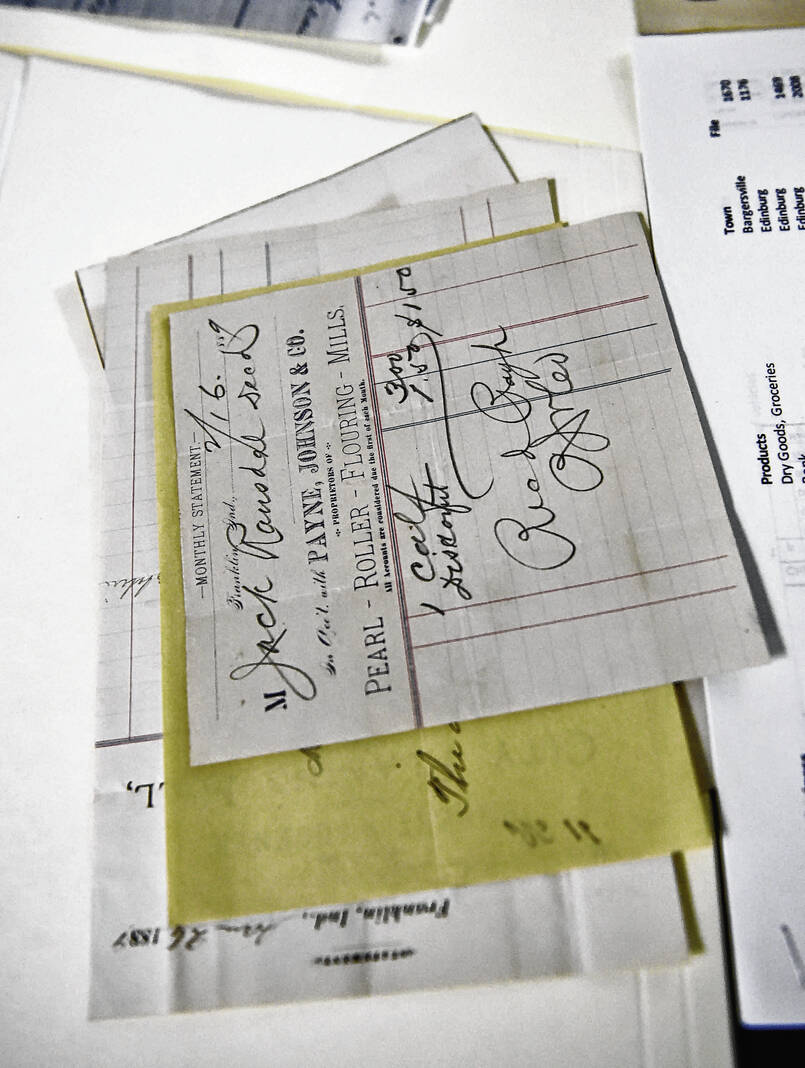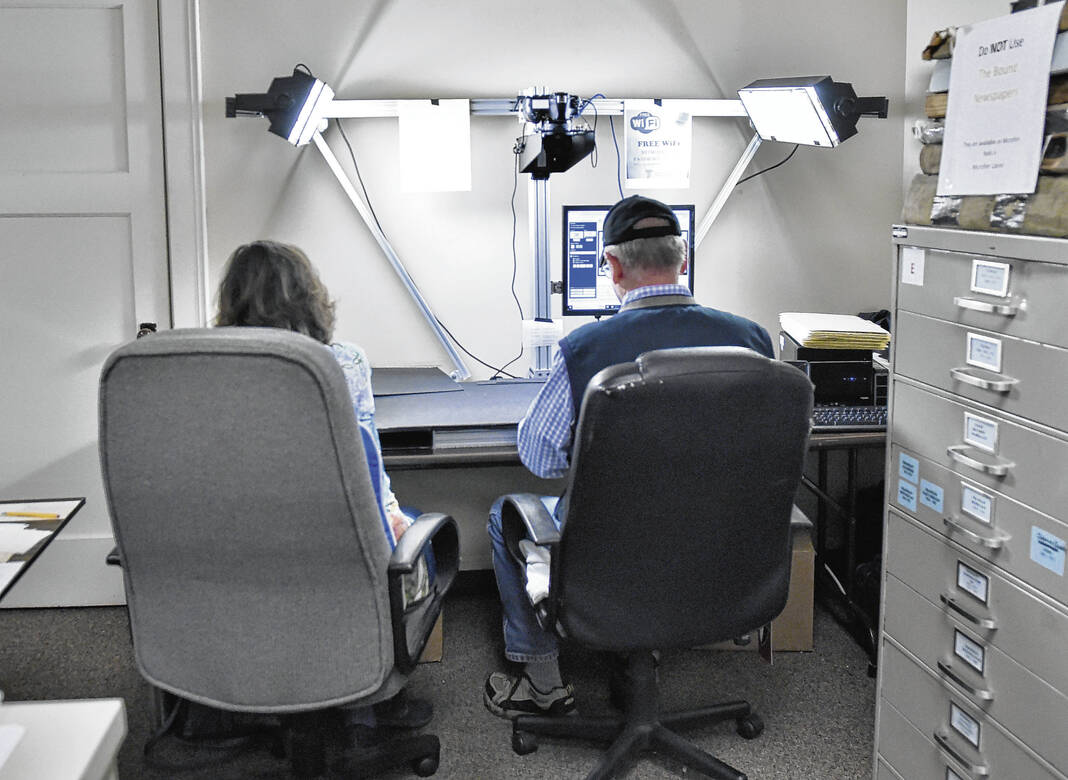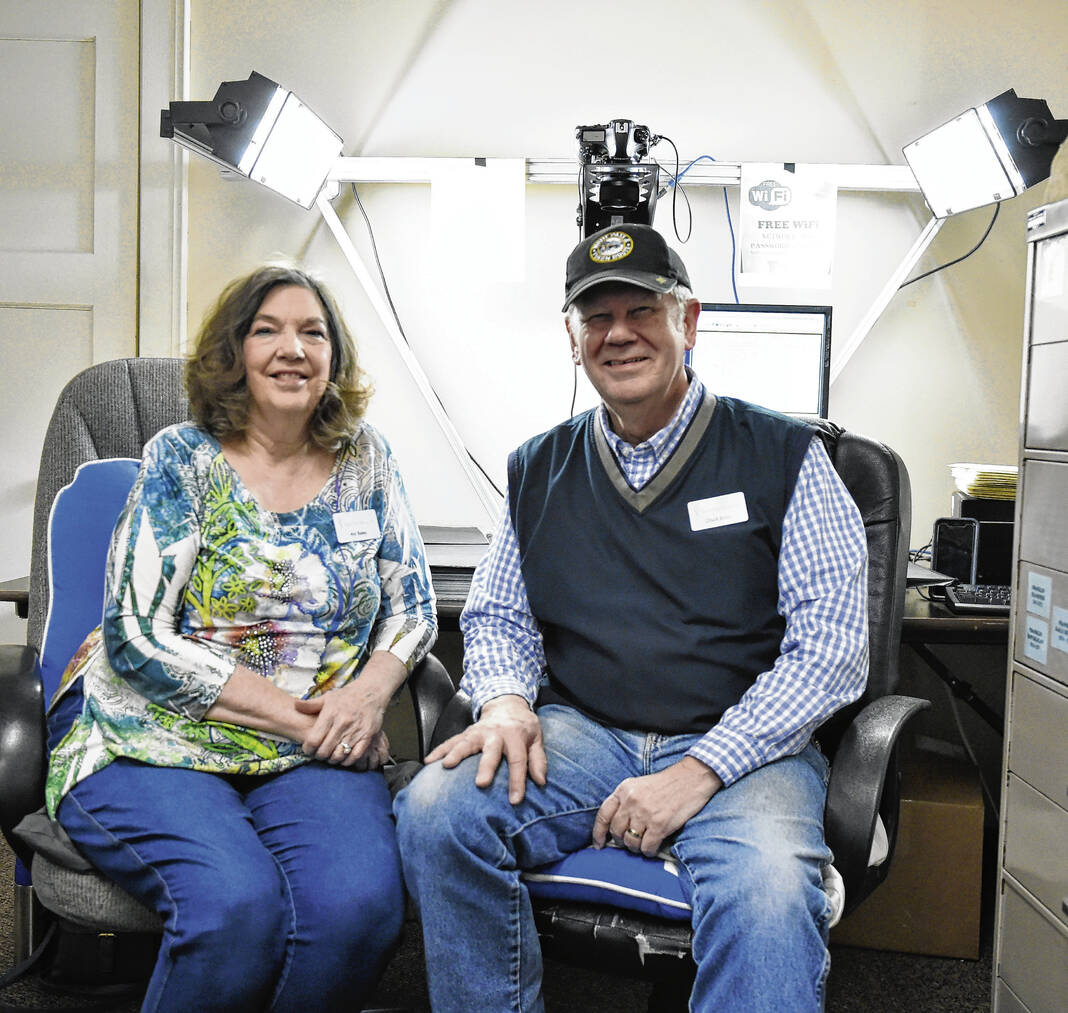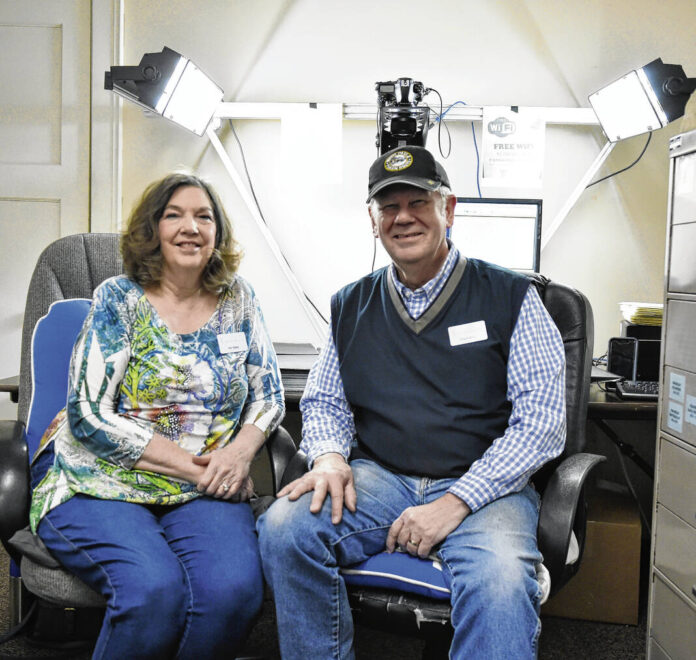
Chuck and Ann Bailey sit in front of the set-up they’ve been using to digitize historic records in the genealogy library at the Johnson County Museum of History. The Baileys, who live in Nineveh, have volunteered their service through the Church of Jesus Christ of Latter-day Saints to photograph the documents, which are then uploaded onto the free FamilySearch archive.
RYAN TRARES | DAILY JOURNAL
Piece by piece, slivers of history have emerged from the past and entered the 21st century.
Birth certificates dating back to the 1820s reveal those who came into the world in Johnson County, while probate records and estate cases catalog the end of those lives. Marriage records, results from court and documents of naturalization unveil county residents dating back nearly 200 years.
Page after page of yellowed paper has been carefully unpacked, photographed and returned to their place.
Chuck and Ann Bailey have spent hundreds of hours in the genealogy library at the Johnson County Museum of History, volunteering their time to digitize county historical records. As part of their senior mission with the Church of Jesus Christ of Latter-day Saints, they are using digital photography to upload documents to FamilySearch.org, a nonprofit group offering free genealogical records.
Their work has ensured that valuable pieces of county history are preserved, said David Pfeiffer, director of the Johnson County Museum of History.
“It’s the future of genealogy and archives, trying to get as much online as you can,” he said. “We wouldn’t have the resources to do something like this on our own, so having their help, a free project they’re doing for us, is a huge benefit that will be useful for so many genealogists down the line.”
The project has been an engrossing journey into the past for the Nineveh residents. Through the effort, the Baileys hope that local residents can more easily discover their own history and heritage.
“We’ve got an opportunity to help do the work for people who are looking for their ancestors who lived here in Johnson County a long time ago,” Chuck Bailey said. “What this is doing is helping so many people work to put that puzzle together, and they’re all over the world.”
Missionary work is one of the core characteristics of the Church of Jesus Christ of Latter-day Saints. The most visible embodiment is in the young men and women who fan out in pairs across the world to teach about their faith.
But mission opportunities are available for all members of the church, including for older adults. These “senior missions” appealed to the Baileys after retirement.
“All along, we thought that someday we’d do a service mission,” Chuck Bailey said. “The church has a website for senior missionary opportunities, so we looked on that and saw an opening for records preservation specialist in the Indianapolis mission.”
Records preservation specialists were trained to download historical public files for FamilySearch, the online genealogical archived sponsored by the Church of Jesus Christ of Latter-day Saints. The site has become one of the largest archives of historical and genealogical records in the world, with 1.2 billion people in the database.
FamilySearch has worked with the Indiana State Archives to digitize marriage and probate records such as wills, estate listings and more, for all 92 counties in the state. The archive provides cameras and equipment to photograph each document and transfer it to a computer.
Those files are downloaded onto a portable hard-drive, and each week, the Baileys send the drive, in a protective cover, to FamilySearch in Utah to upload online.
“They double-check everything, but within six to eight days, it’s online for everybody to see,” Chuck Bailey said.
Genealogy and family history has been a passion for both Church and Ann Bailey — particularly the history of Johnson County. Chuck Bailey’s fourth great-grandfather, Benjamin Bailey, was one of the first settlers in Nineveh Township in 1823. Ann Bailey’s ancestors arrived south of Franklin in 1831.
They had used FamilySearch in the past to learn more about their own backgrounds, which made the project even more appealing.
Their heritage is entwined throughout county history, which has made each day of their work a chance to learn more about their pasts.
“You find some different pieces to the puzzle that I didn’t know — little pieces of information,” Ann Bailey said. “It’s been nice to be able to pay for all of the different times people could find their stories, and even find some of the information between the dashes of a person life.”
After contacting church officials in 2021 to see what was available, the Baileys were put in contact with a couple working in Shelby County documenting records. They met the couple for about an hour and decided to pursue it themselves.
No one was working on records in Johnson County, so they started the process of getting permission to access documents locally. Linda Talley, genealogy librarian at the Johnson County Museum of History as well as being Chuck Bailey’s third cousin, directed them to Johnson County government; because though the records are housed in the museum, they belong to the county.
After presenting their plans, the county commissioners approved their project on Feb. 28, 2022.
While the county attorney finalized the permission, the Baileys discovered FamilySearch was ready to start filming records in Brown County. Living so close to Nashville, they offered in April 2022 to start working on those documents until the Johnson County project was ready to start.
“We were there until the first of August filming all of their loose probate records. Of course, Brown County is a smaller county compared to Johnson. So we got it started, and when finally they had this ready, another fellow took over for us down there,” Chuck Bailey said.
For the past six months, the Baileys have spent four days a week in the museum basement, pouring over documents. Their Nikon D850 camera is mounted 27 inches above the documents, and each morning, Chuck and Ann Bailey have to calibrate the camera and make sure it is connected to the computer properly.
The images that show up are crisper and more clearly digitized than the original document.
“We’ll have old documents where the ink is really faint and hard to read. But after taking a picture of it, I can zoom in, and it’s clearer than what I can see with my own eye,” Chuck Bailey said.
They have been approved to photograph 23 collections of marriage and probate records, including tax records, wills, obituaries up to 1940 and more.
The records that have been digitized and sent to FamilySearch are already online and can be found by searching for “Johnson County, Indiana.” At a later time, people will be able to search by name.
At this point, Chuck and Ann Bailey have photographed about 150,000 images. The estimation is that the Johnson County project will take about two years. The Baileys plan to do the first year of the work, before handing it off to another volunteer.
“All of it has genealogical value,” Chuck Bailey said. “And this is a huge insurance policy. If there’s a fire or a flood down here in the basement, and these records are destroyed, once we capture them, they can see exactly what they had.”
AT A GLANCE
FamilySearch archives
What: A genealogical online archive organized by an international, nonprofit organization dedicated to helping people discover their family story, and is one of the largest archives of historical and genealogical records in the world.
Who: Sponsored by The Church of Jesus Christ of Latter-day Saints
When: Founded in 1999
What’s available: So far, 1.2 billion people are entered into the database’s world family tree, and Johnson County historical documents are currently being entered into the database.
Finding information: Go to FamilySearch.org. Johnson County information is not yet indexed by name, but people can search “Johnson County, Indiana” to find local records.


